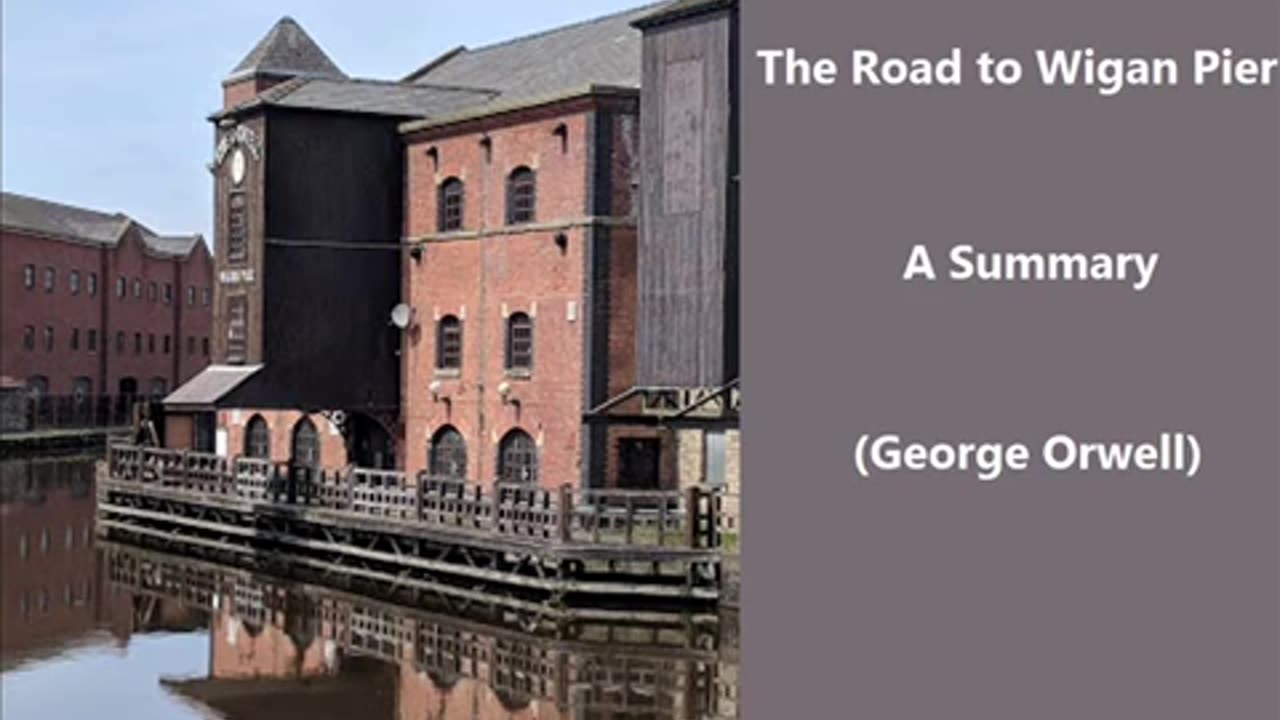Premium Only Content

Summary: The Road to Wigan Pier (George Orwell)
"The Road to Wigan Pier" is a book written by the British author George Orwell. It was published in 1937 and is a non-fiction work that combines elements of social commentary, journalism, and personal reflection. The book is divided into two parts, each dealing with different aspects of life in industrial northern England during the 1930s.
The First Part: The first part of the book is a documentary-style account of Orwell's travels in the industrial towns and mining communities of northern England. He explores the harsh living conditions, poverty, and unemployment experienced by the working-class people in these areas. Orwell provides vivid descriptions of the squalid housing, poor sanitation, and lack of opportunities for the working class. He also discusses the impact of coal mining on the health and safety of the miners.
The Second Part: In the second part of the book, Orwell shifts his focus to his own political beliefs and social commentary. He discusses his own background as a middle-class intellectual and his growing awareness of the social injustices and inequalities he witnessed during his travels. Orwell criticizes the British left and offers his own views on socialism and social reform. He argues that socialism should be more concerned with improving the living conditions of the working class than with ideological debates.
"The Road to Wigan Pier" is notable for its blend of personal narrative, investigative journalism, and political analysis. Orwell's writing is characterized by his keen observations, empathy for the suffering of the working class, and his call for social reform. The book also reflects his evolving political and social beliefs, as he moved from a more middle-class intellectual perspective to a deeper understanding of the struggles faced by the working class.
Overall, "The Road to Wigan Pier" remains an important work in the canon of social and political literature, offering insights into the social conditions of the time and Orwell's own ideological journey. It is considered one of Orwell's early works that foreshadows the themes and concerns he would later explore in his more famous works like "Animal Farm" and "Nineteen Eighty-Four."
-
 14:59
14:59
T-SPLY
5 hours agoKilmar Is Facing Trafficking Charges / Lawyer Demands His Release!
3034 -
 DVR
DVR
Laura Loomer
2 hours agoEP126: OPEN BORDERS INTIFADA
2.31K1 -
 LIVE
LIVE
Spartan
8 hours agoPro Halo Player | Scrims vs FaZe @ 3 EST then Ranked and/or SWTOR
57 watching -
 LIVE
LIVE
AlaskanBallistics
6 hours agoI Love this Gun Podast #44 Best 10mm Bear Protection Rounds!
74 watching -
 3:25:09
3:25:09
Barry Cunningham
5 hours agoHERE'S THE NEWS AND SCHEDULE FOR AN AMERICA FIRST WEEKEND!
28.4K24 -
 LIVE
LIVE
I_Came_With_Fire_Podcast
9 hours agoISRAEL STRIKES IRAN | PADILLA ARREST | CA SUES PRES. TRUMP
245 watching -
 LIVE
LIVE
S0lidJ
59 minutes agoTis a Solid Friday Night
22 watching -
 3:14:27
3:14:27
Mally_Mouse
6 hours agoLet's Play!! - Plants vs. Zombies OG
7561 -
 10:31
10:31
China Uncensored
6 hours agoHow China Is Secretly Behind the Anti-ICE Riots
3.43K12 -
 LIVE
LIVE
Saycred Angel Live
1 hour ago🍻FRIDAY FAMILY FIGHT NIGHT🍻!TANGIA | !GIVEAWAY #RUMBLETAKEOVER!
36 watching